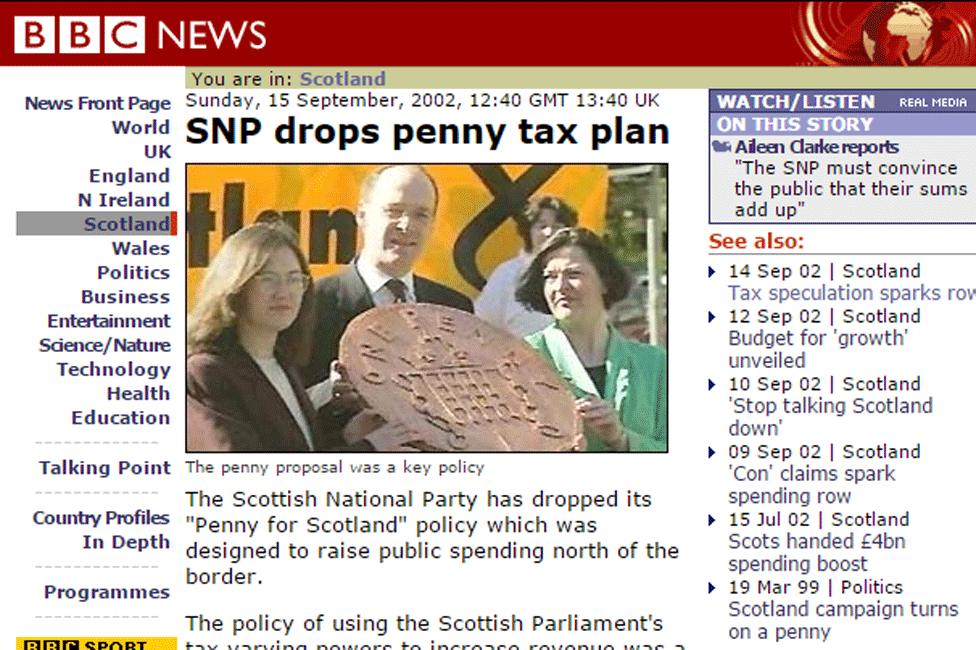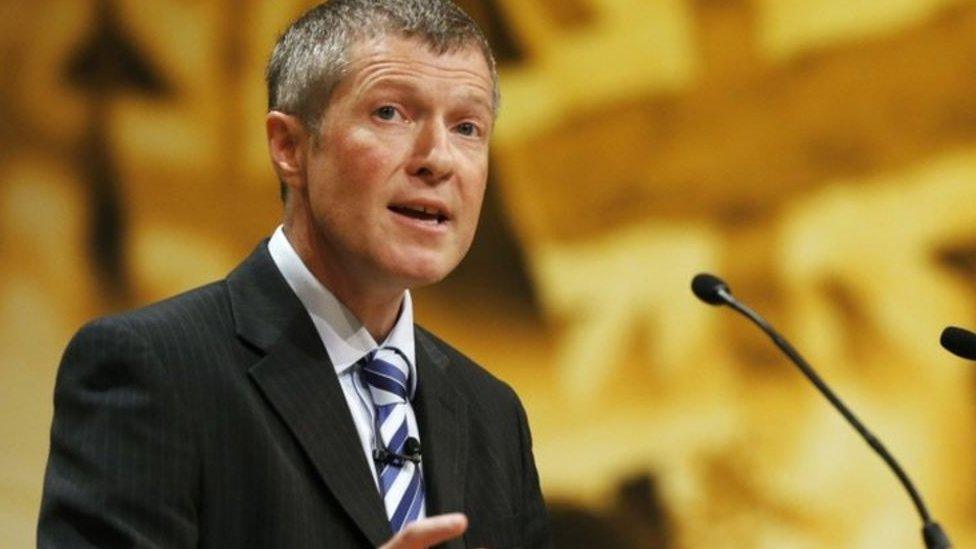Penny for Willie Rennie's tax raising thoughts
- Published

Pennies from heaven? Lib Dem Willie Rennie resurrects a tax policy from the past
Penny for Scotland, anyone? Willie Rennie of the Liberal Democrats believes that sufficient voters will say Yes to that offer to allow it to attract the title "popular".
The phrase "Penny for Scotland" is, of course, most commonly attached to the proposal by the SNP at the Holyrood elections in 1999 to reverse, for Scotland alone, a cut in income tax announced by the then Labour Chancellor.
It was evinced by John Swinney - then and now the head SNP honcho on the topic of tax. Mr Swinney later dropped the plan, external, arguing that it had been overtaken because Labour had ended up increasing the level of tax paid by people in Scotland. Not, he stressed, because the SNP plan had annoyed voters.
Mr Rennie undoubtedly has the Swinney plan in mind with his announcement today. Indeed, he is explicitly challenging the SNP to match his proposal - while stressing that it is different to the Nationalists' former scheme.
Would people in Scotland pay more?
The Scottish Lib Dem plan, understandably, derives rather from their own party's past. Previously, Paddy Ashdown proposed an increase in UK income tax of one per cent, to be hypothecated to fund education. The policy has also featured in past Scottish Lib Dem discussions.
Now Mr Rennie has revived it, founded on a belief - disputed by some - that people in Scotland would be willing to pay more tax if it could be demonstrated that the product would be explicitly devoted to the public good.
The Scottish Lib Dem leader says that his plan would raise £475m a year for Scottish education. However, given that schools education is delivered by local authorities, Mr Rennie is not in sole command of such matters - and would not be, even if he were to be elevated to Scottish government office.

How the headlines read in 2002
Despite that, he is adamant that his plan would raise cash for education. Firstly, he notes that substantial elements of the plan would be driven by the Scottish government - such as funding for colleges and the creation of a Pupil Premium, already in place in England, to channel funding to schools which need help to bolster pupils from disadvantaged backgrounds.
Secondly, he argues that education is the dominant element of council spending - and that local authorities are crying out for cash to improve the system. He believes it would be sensibly spent.
Another controversy arises. Would an added tax imposition in Scotland bolster or hinder the economy? Would it be fair and progressive?
'Small price to pay'
Crucially, Mr Rennie proposes levying the penny on all rates of income tax right now, from April. He wants to use the Calman powers which permit variation across all bands - without the capacity to differentiate between upper and lower. He will table a Scottish Budget amendment accordingly.
Mr Swinney has ruled out such a move on the grounds that it is not "progressive", that it does not permit him to levy an extra charge on upper earners while protecting those on lower incomes.
To which Mr Rennie says that one penny, generally, is a "small price" to pay. Further, he notes that those on top incomes will pay far more - and that the lowest earners are protected by measures introduced at a UK level, under Lib Dem prompting, to increase the salary starting point at which income tax kicks in.

Scottish Lib Dem leader Willie Rennie proposes levying the penny on all rates of income tax right now
That means, he says, that no-one will pay more until they are earning £19k or more, that someone on the median income will pay an extra £2.90 a month and that almost half of the additional imposition will fall upon the richest 12%.
If Mr Rennie fails to persuade Mr Swinney to incorporate the plan into his budget for implementation right away, the Lib Dems will include the plan in their manifesto for the May elections, with the proviso that they would then be able to revise it in the light of the new Smith Commission tax plans which allow differentiation across the bands.
But it's still a tax increase. A tax increase to be paid in Scotland alone. However modulated, however targeted, it's an increase in taxation.
Will voters in Scotland favour that? Right now? Will they vote for it in May? Mr Rennie is adamant that the Penny for Education plan was popular in the past - and will be again.
Taxing questions
Others incline to the view that people are often keen to see productive investment in education, the NHS or whatever - with the unstated proviso that the cost should fall elsewhere.
The anecdotal presumption in some quarters is that some voters may be enthusiastic advocates of tax increases until they pick up their pencil in the voting booth.
In which respect, this is a political calculation by the Liberal Democrats. Given their predicament post the UK General Election, they know they need to make an impact. An early impact. Hence the early announcement of this plan.
They know they need to set themselves apart from their rivals. Hence Mr Rennie's challenge to his opponents today to state their views on his proposals.
It adds yet again to the sense that this will be a different devolved election - one where tax is as prominent as spending.
- Published27 January 2016
